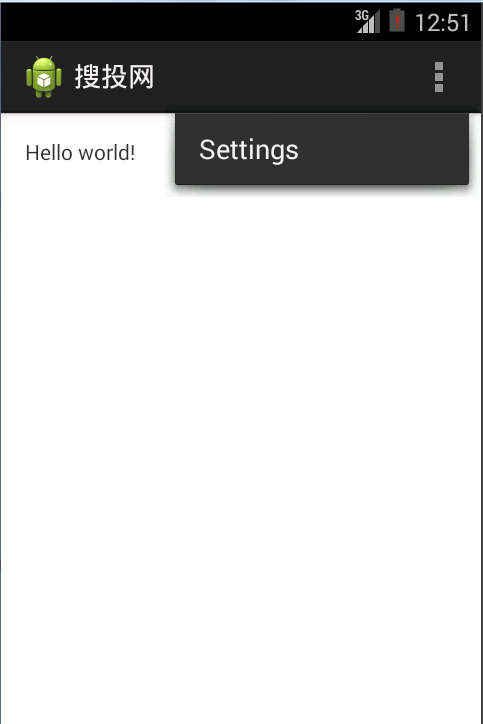我们继续的沿用上一篇所建立的应用。
Android应用程序可以分为:应用程序源代码(.java),应用程序描述文件(.xml),各种资源。
可以这么理解: 安卓应用程序,通过java代码来实现其业务逻辑,由XML文件来描述其界面及其他一切资源。
我们来看看下面的几类文件:
一、资源极其描述文件。
1. strings.xml 文件
strings.xml 文件是定义程序中使用的字符串资源。
打开HelloWorld项目,展开res/values/目录,找到strings.xml 文件。
建立项目的时候自动创建的代码:
<?xml version="1.0" encoding="utf-8"?>
<resources>
<string name="app_name">搜投网</string>
<string name="action_settings">Settings</string>
<string name="hello_world">Hello world!</string>
</resources>
代码注释版:
<?xml version="1.0" encoding="utf-8"?>
<!-- 定义了xml的版本,以及编码方式 -->
<!--resources 定义资源的标签 -->
<resources>
<!-- String 定义了三个字符串常量 ,该变量可以在java和xml文件中使用 -->
<!-- 字符串的为 appname ,内容为 “搜投网” -->
<string name="app_name">搜投网</string>
<!-- 字符串的为 appname ,内容为 “Settings” -->
<string name="action_settings">Settings</string>
<!-- 字符串的为 appname ,内容为 “Hello world!” -->
<string name="hello_world">Hello world!</string>
</resources>
在AndroidManifest.xml文件中可以找到相应的引用。
对应的效果:

2. styles.xml 文件。
styles.xml 文件是预先定义布局中需要显示的样式,如文本的显示颜色和字体等。
创建项目的时候生成的代码:
<resources>
<!--
Base application theme, dependent on API level. This theme is replaced
by AppBaseTheme from res/values-vXX/styles.xml on newer devices.
-->
<style name="AppBaseTheme" parent="android:Theme.Light">
<!--
Theme customizations available in newer API levels can go in
res/values-vXX/styles.xml, while customizations related to
backward-compatibility can go here.
-->
</style>
<!-- Application theme. -->
<style name="AppTheme" parent="AppBaseTheme">
<!-- All customizations that are NOT specific to a particular API-level can go here. -->
</style>
</resources>
在name="AppBaseTheme"上加以下代码:
<item name="android:textSize">30sp</item>
<item name="android:textColor">#111</item>
在 name="AppTheme" 上加以下代码:
<item name="android:textSize">8sp</item>
代码解析:
<?xml version="1.0" encoding="utf-8"?>
<resources>
<!--
Base application theme, dependent on API level. This theme is replaced
by AppBaseTheme from res/values-vXX/styles.xml on newer devices.
-->
<style name="AppBaseTheme" parent="android:Theme.Light">
<!--
Theme customizations available in newer API levels can go in
res/values-vXX/styles.xml, while customizations related to
backward-compatibility can go here.
-->
<!-- 定义类 "AppBaseTheme" 样式文本的大小为 30sp ,颜色为 #111 -->
<item name="android:textSize">30sp</item>
<item name="android:textColor">#111</item>
</style>
<!-- Application theme. -->
<style name="AppTheme" parent="AppBaseTheme">
<!-- All customizations that are NOT specific to a particular API-level can go here. -->
<!-- 定义类 "AppTheme" ,在保持父样式的其他属性不变的情况下,该样式文本的大小为 8sp -->
<item name="android:textSize">8sp</item>
</style>
</resources>
3. dimens.xml文件
dimens.xml文件通常用于创建布局常量,在样式和布局资源中定义边界、高度和尺寸大小时经常用到维度,使用“<dimen>”标签指定一个维度资源 。
用标识符表示维度单位:
px(像素):屏幕上的像素。
in (英寸):长度单位。
mm(毫米):长度单位。
pt (磅):1/72英寸。
dip(与密度无关的像素):一种基于屏幕密度的抽象单位。
sp (与刻度无关的像素):与pd类似。
建议:使用sp作为文字的单位,使用dip作为其他元素的单位。
<resources>
<!-- Default screen margins, per the Android Design guidelines. -->
<dimen name="activity_horizontal_margin">16dp</dimen>
<dimen name="activity_vertical_margin">16dp</dimen>
</resources>
4. colors.xml 文件
有些应用可能会没有这个文件。
使用“<color>”标签定义一个颜色资源。
颜色值由RGB(三位16进制数)或RRGGBB (六位16进制数)表示,以“# ”符号开头。例如:#00f(蓝色), #00ff00(绿色)。
定义透明色,表示透明度的alpha通道值紧随“#”之后。例如: #600f(透明蓝色), #7700ff00(透明绿色)
<?xml version="1.0" encoding="utf-8"?>
<resources>
<color name="listDivider">#ffcc99</color>
<color name="character">#f37301</color>
</resources>
5. activity_main.xml 文件
位于res文件夹的layout子文件夹中。
定义第一个显示界面布局(默认)。
<RelativeLayout xmlns:android="http://schemas.android.com/apk/res/android" xmlns:tools="http://schemas.android.com/tools" android:layout_width="match_parent" android:layout_height="match_parent" android:paddingBottom="@dimen/activity_vertical_margin" android:paddingLeft="@dimen/activity_horizontal_margin" android:paddingRight="@dimen/activity_horizontal_margin" android:paddingTop="@dimen/activity_vertical_margin" tools:context=".MainActivity" > <TextView android:layout_width="wrap_content" android:layout_height="wrap_content" android:text="@string/hello_world" /> </RelativeLayout>
解析后的代码:
<?xml version="1.0" encoding="utf-8"?> <!-- 定义xml版本,以及编码方式 --> <!-- 定义了一个 相对布局 --> <!-- 属性" http://schemas.android.com/apk/res/android" 是xml的命名空间,告诉安卓工具,将要涉及公共的属性已被定义在xml命名空间。--> <RelativeLayout xmlns:android="http://schemas.android.com/apk/res/android" xmlns:tools="http://schemas.android.com/tools" android:layout_width="match_parent" android:layout_height="match_parent" android:paddingBottom="@dimen/activity_vertical_margin" android:paddingLeft="@dimen/activity_horizontal_margin" android:paddingRight="@dimen/activity_horizontal_margin" android:paddingTop="@dimen/activity_vertical_margin" tools:context=".MainActivity" > <!-- 添加了一个textView 控件,其显示的内容是 string.xml 文件定义的内容 --> <TextView android:layout_width="wrap_content" android:layout_height="wrap_content" android:text="@string/hello_world" /> </RelativeLayout>
6. AndroidManifest.xml文件
根目录下的AndroidManifest.xml文件是一个清单文件,用于应用程序的全局描述。
应用程序的包名,该包名将作为应用程序的唯一标识符。
包含的组件如:Activity、Service、BroadcastReceiver及ContentProvider等。
应用程序兼容的最低版本。
声明应用程序需要的链接库。
声明应用程序自身应该具有的权限。
其他应用程序访问该应用程序时应该具有的权限。
<?xml version="1.0" encoding="utf-8"?>
<manifest xmlns:android="http://schemas.android.com/apk/res/android"
package="com.souvc.helloworld"
android:versionCode="1"
android:versionName="1.0" >
<uses-sdk
android:minSdkVersion="19"
android:targetSdkVersion="19" />
<application
android:allowBackup="true"
android:icon="@drawable/ic_launcher"
android:label="@string/app_name"
android:theme="@style/AppTheme" >
<activity
android:name="com.souvc.helloworld.MainActivity"
android:label="@string/app_name" >
<intent-filter>
<action android:name="android.intent.action.MAIN" />
<category android:name="android.intent.category.LAUNCHER" />
</intent-filter>
</activity>
</application>
</manifest>
解析后的代码:
<?xml version="1.0" encoding="utf-8"?>
<!-- 定义xml版本,以及编码方式 -->
<manifest xmlns:android="http://schemas.android.com/apk/res/android"
package="com.souvc.helloworld"
android:versionCode="1"
android:versionName="1.0" >
<!-- 定义了包名 -->
<!-- 定义了版本 -->
<!-- 定义了版本名-->
<!-- 可兼容的最低版本,以及当前版本 -->
<uses-sdk
android:minSdkVersion="19"
android:targetSdkVersion="19" />
<application
android:allowBackup="true"
android:icon="@drawable/ic_launcher"
android:label="@string/app_name"
android:theme="@style/AppTheme" >
<!-- 定义应用程序的图标 -->
<!-- 定义应用程序的名字 -->
<!-- 定义应用程序的主题 -->
<!-- 应用程序第一个执行的是 com.souvc.helloworld 下的 MainActivity 类 -->
<activity
android:name="com.souvc.helloworld.MainActivity"
android:label="@string/app_name" >
<intent-filter>
<action android:name="android.intent.action.MAIN" />
<category android:name="android.intent.category.LAUNCHER" />
</intent-filter>
</activity>
</application>
</manifest>
二、 逻辑代码文件。
1. MainActivity.java 文件。
位于src文件夹中。
应用程序的操作控制部分在java源程序中定义
package com.souvc.helloworld; import android.os.Bundle; import android.app.Activity; import android.view.Menu; public class MainActivity extends Activity { @Override protected void onCreate(Bundle savedInstanceState) { super.onCreate(savedInstanceState); setContentView(R.layout.activity_main); } @Override public boolean onCreateOptionsMenu(Menu menu) { // Inflate the menu; this adds items to the action bar if it is present. getMenuInflater().inflate(R.menu.main, menu); return true; } }
解析后的代码:
package com.souvc.helloworld; //引入相关的类 import android.os.Bundle; import android.app.Activity; import android.view.Menu; /** * @Title: MainActivity.java * @Package com.souvc.helloworld * @Description:操作安卓界面的代码 * @author souvc * @date 2016-1-1 * @version V1.0 */ public class MainActivity extends Activity { //第一次创建该Activity时的回调方法 @Override protected void onCreate(Bundle savedInstanceState) { super.onCreate(savedInstanceState);//调用父类的onCreate()构造函数,savedInstanceState保存当前的Activity的状态信息 setContentView(R.layout.activity_main);//设置当前显示的布局 } @Override public boolean onCreateOptionsMenu(Menu menu) { // Inflate the menu; this adds items to the action bar if it is present. getMenuInflater().inflate(R.menu.main, menu); return true; } }
2. R.java 文件
由Android-Eclipse自动生成,不能直接修改。
用资源id的形式标注drawable、layout、values文件夹中的资源信息。
/* AUTO-GENERATED FILE. DO NOT MODIFY. * * This class was automatically generated by the * aapt tool from the resource data it found. It * should not be modified by hand. */ package com.souvc.helloworld; public final class R { public static final class attr { } public static final class color { public static final int character=0x7f040001; public static final int listDivider=0x7f040000; } public static final class dimen { /** Default screen margins, per the Android Design guidelines. Customize dimensions originally defined in res/values/dimens.xml (such as screen margins) for sw720dp devices (e.g. 10" tablets) in landscape here. */ public static final int activity_horizontal_margin=0x7f050000; public static final int activity_vertical_margin=0x7f050001; } public static final class drawable { public static final int ic_launcher=0x7f020000; } public static final class id { public static final int action_settings=0x7f090000; } public static final class layout { public static final int activity_main=0x7f030000; } public static final class menu { public static final int main=0x7f080000; } public static final class string { /** 字符串的为 appname ,内容为 “Settings” */ public static final int action_settings=0x7f060001; /** String 定义了三个字符串常量 ,该变量可以在java和xml文件中使用 字符串的为 appname ,内容为 “搜投网” */ public static final int app_name=0x7f060000; /** 字符串的为 appname ,内容为 “Hello world!” */ public static final int hello_world=0x7f060002; } public static final class style { /** Base application theme, dependent on API level. This theme is replaced by AppBaseTheme from res/values-vXX/styles.xml on newer devices. Base application theme for API 11+. This theme completely replaces AppBaseTheme from res/values/styles.xml on API 11+ devices. API 11 theme customizations can go here. Base application theme for API 14+. This theme completely replaces AppBaseTheme from BOTH res/values/styles.xml and res/values-v11/styles.xml on API 14+ devices. API 14 theme customizations can go here. */ public static final int AppBaseTheme=0x7f070000; /** Application theme. */ public static final int AppTheme=0x7f070001; } }
以上的注释,当在xml注释后,自动生成该注释。